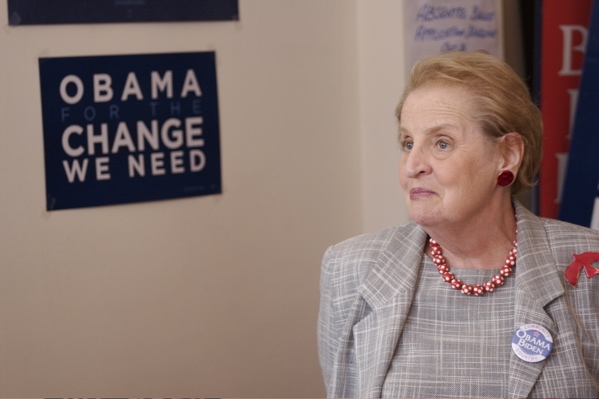Former Secretary of State Madeleine Albright dismissed Mitt Romney’s big foreign policy speech on Monday as trivial ideas coming from a foreign policy lightweight.
Albright, a surrogate for President Obama, told reporters on a conference call that Romney’s foreign policy vision would not score high marks in her classroom.
“I just find him very shallow in the ideas that he has,” she said. “Shallow. The op-ed that he had in the Wall Street Journal a couple of days ago? I’m a professor and if one of my students turned it in they’d get a ‘C’ because he gave absolutely no specifics.”
Albright was referring to Romney’s Sept. 30 WSJ piece, in which he called for “a new strategy toward the Middle East.” That topic was also central in his foreign policy address Monday at the Virginia Military Institute. Romney laid out a vision for American power he said would be more proactive than Obama’s, while offering up policy specifics that critics described as not much different from those Obama is already employing.
For example, Romney said Obama has “not signed one new free trade agreement in the past four years,” a statement he’s been using for some time that ignores the free trade pacts Obama has signed into law while in office.
Albright said Romney’s foreign policy take is a litte off-the-wall, referring to his previous characterization of Russia as America’s “number one geopolitical foe.” Romney promised to engage the former superpower if elected.
“There is a longing for American leadership in the Middle East — and it is not unique to that region,” Romney said in the prepared version of his remarks at VMI. “It is broadly felt by America’s friends and allies in other parts of the world as well — in Europe, where Putin’s Russia casts a long shadow over young democracies, and where our oldest allies have been told we are ‘pivoting’ away from them.”
Albright described Romney’s stance on Russia as another example of a man out of his depth when it comes to foreign policy.
“Of the various weird things Gov. Romney has said, his postion on Russia is truly out of date,” she said. “If you were living in the 20th century, his position on Russia might make a certain amount of sense. We’re living in the 21st century, and to think that Russia is our biggest geostrategic threat makes absolutely no sense.”
Albright said global terrorism is the biggest national security threat, and praised Obama for some of his engagement with the Russians.
“The truth is the Russians have been pretty helpful on Iran. Not on Syria, but they have on Iran,” Albright said. “I think we can’t look at them the way we did during the Cold War. So much of this speech had kind of a Cold War tone. A little bit of nostalgia for that period.”






